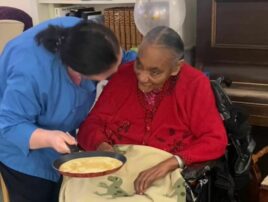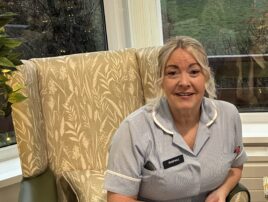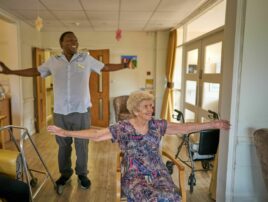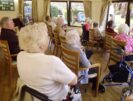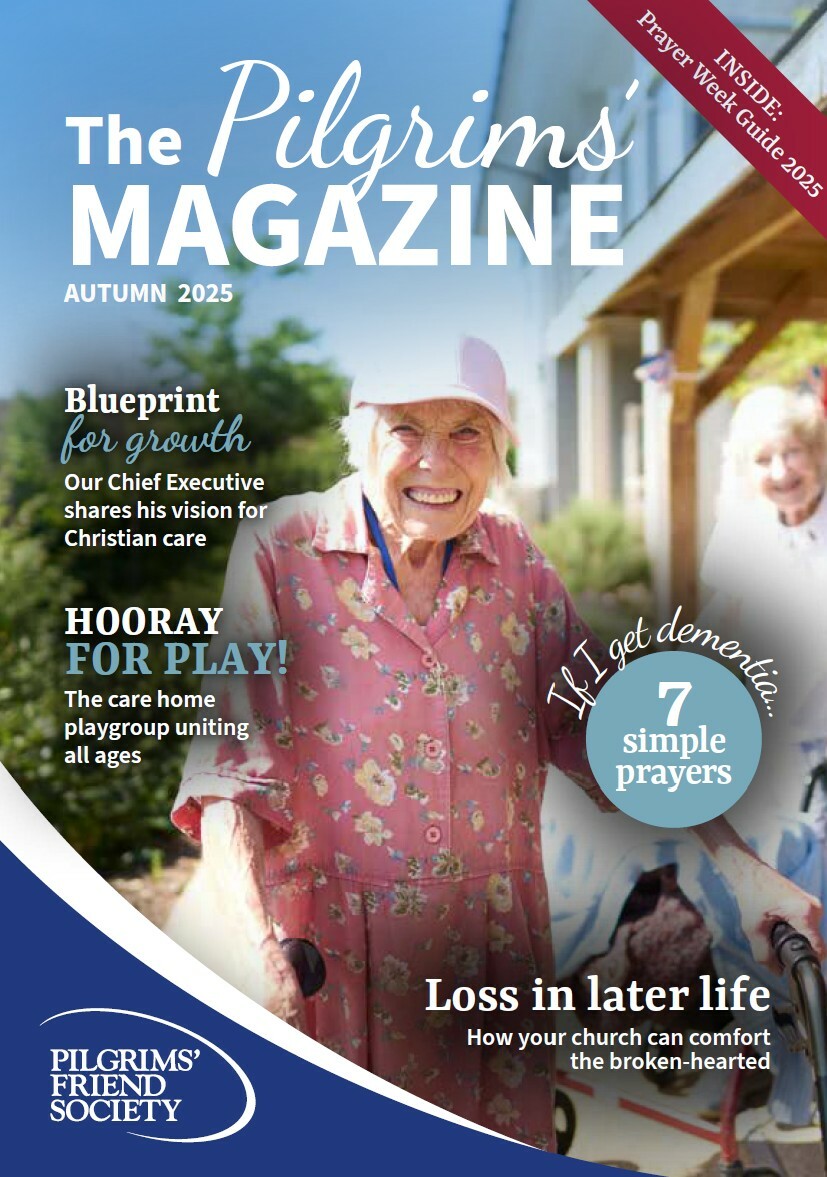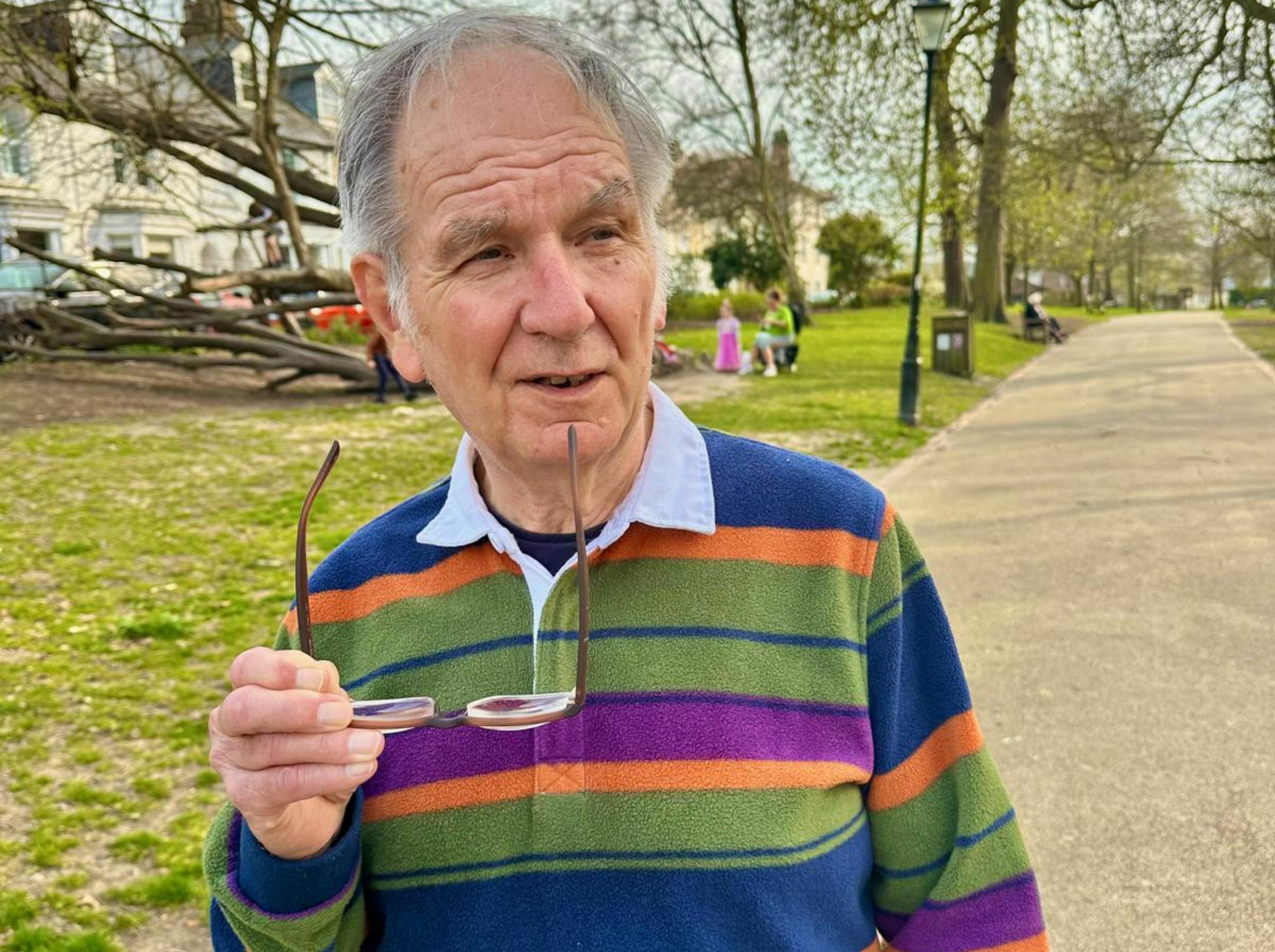
Tuesday 26th August 2025
A family's journey to care
Tyler Sewell-Nicholas
After developing dementia, Elaine’s brother David came to live at Milward House in Tunbridge Wells. We spoke to Elaine about her experience of finding care for David and how he’s settled into life at the care home

When Elaine speaks about her brother David, there’s a mix of admiration, sadness, and deep affection. At 74, Elaine is the younger sister to David, who is now 78. Despite the age gap and their lives often taking them in different directions – David spent ten years living and working in Kenya while Elaine was raising a family in the UK – their bond has always remained strong, anchored by shared holidays and family traditions like spending Christmas and Easter together.
After their mother passed away, David continued the tradition, joining Elaine and her family on holidays and for seasonal gatherings in Hildenborough, Tonbridge. But during one Christmas visit, not long before the pandemic hit, Elaine first noticed something was off. David, usually sharp and capable, got lost on the way back to Stafford. “It’s a very straightforward route, just a couple of motorways,” Elaine explained. “But he couldn’t find his way, and that just wasn’t like him.”
The signs started to add up. David, a lifelong nature enthusiast, had an uncanny ability to identify birds and wildflowers on walks. But soon, even the most basic names escaped him. Elaine recalls asking him about a common flower during a walk and being met with a blank stare. “That’s when I really started to worry,” she says. Her daughter, who works in care, confirmed her fears: “Mum, struggling to find words for familiar things like that is one of the first signs of dementia.”
As David’s condition worsened, the toll on Elaine’s life grew heavier. She had spent more than a decade caring for her husband through autoimmune liver disease, before losing him during the height of the COVID pandemic. A few years later, she found herself once again stepping into the role of a carer, this time for her older brother. When David turned up for a planned holiday bringing nothing but a pair of underpants and six oranges, it was clear he could no longer live independently. He had also asked Elaine to help manage his finances – a sign that he was becoming aware of his limitations. Elaine took quick and decisive action: she sold David’s house in Stafford and brought him to live with her full-time.

To receive your copy of the magazine FREE four times a year, sign up now.

What followed was a demanding and emotional eight-month period. Elaine, with help from her son who lived with her, managed David’s care while also being Power of Attorney, liaising with banks, and coordinating support with organisations like Age UK and the Alzheimer’s Society. David, though struggling cognitively, was still eager to help. He enjoyed gardening, both in Elaine’s garden and at the local churchyard, and was happiest when he felt useful.
Despite these bright spots, caring for David full-time was a significant strain. Elaine had to give up visiting her three children and grandchildren could no longer stay with her daughter in Kent, where she often went to help with her twin grandchildren. “It was difficult to juggle everything,” she reflects. “David wouldn’t go to a day centre, so I didn’t get that break. And I’m not a confident driver, so long trips were a challenge. I just knew I couldn’t manage long-term.”
At the same time, there were preparations underway for her daughter in Sussex to move in with her, and plans to convert Elaine’s family bungalow into a shared home with a granny annexe where Elaine would live. With everything that was going on, it was clear that David needed more than Elaine could offer on her own. Together, the family began looking for residential care that could provide the right environment for David.
Elaine’s daughter led the search, and the family visited five care homes in total. Some were undeniably luxurious, but they didn’t feel right. “David never cared about luxury,” Elaine explained. “He just needed to be somewhere kind, where he felt respected, and where he wouldn’t be separated out because of his dementia.” At several homes they visited, residents with dementia were isolated from the rest of the community, something the family didn’t want for David.
"He just needed to be somewhere kind, where he felt respected.”
Then they found Milward House in Tunbridge Wells. From their first visit, the warmth and ethos of the home stood out. “It was the kindness and inclusiveness that really mattered,” Elaine said. “We’re a Christian family, and Milward’s Christian foundation meant we all really connected with the values of the home.”
David moved into Milward House in April 2024. In the beginning, Elaine worried about how he would settle in. But the transition was thoughtfully managed. Sarah and Mouna, senior staff members, came to Elaine’s home to meet David beforehand. They talked to him directly, involving him in the process and helping him feel part of the decision.


At first, David was placed in a room at the top of the building. But after concerns about wandering, especially at night, he was moved to a room closer to the care staff. The care team adapted quickly to his needs, offering structure, comfort, and most importantly, respect. “They really try to understand who David is,” Elaine says. “He used to run building sites. He was in charge. So, they talk to him like he’s someone whose opinion still matters, which it does.”
One of David’s favourite parts of his new life is his daily outing with Peter, who is a Hummingbird at the home. Hummingbirds are specially trained to provide one-to-one, meaningful interactions with ‘family members’ (those who live with us) who have dementia, offering companionship, and spiritual support throughout the day. He takes time every day to go out with David. Together they explore local parks and gardens, and keep an eye on buildings under construction. “It’s a perfect match,” Elaine says. “David loves engineering and being outdoors. He worked on the Haweswater Dam, went fell walking in the Lake District, and was always on the move. These outings are exactly what he needs.”
David’s passion for engineering still shines through. He often talks about Isambard Kingdom Brunel, the famous 19th-century engineer behind some of Britain’s most iconic bridges and tunnels, and Elaine bought him an illustrated book about Brunel. “Peter sat down with him to go through it too,” she recalls. “It brought David so much joy.”
Now that David is settled in the home, Elaine visits him weekly. “The home always welcomes me with a smile,” she says. “I take him out, usually to a garden centre. He loves the flowers, the colours. We have coffee and chat. It’s just an hour, but it means so much.”
Reflecting on everything that has happened, Elaine admits that she and David weren’t especially close growing up. “We had our own lives,” she says. “But I want him to be cared for, to be safe. And at Milward House, I know he is. He’s happy. You can see it in his face, he’s content.”
Her gratitude for the Milward House team is deeply felt. “Susan, the Activities and Community Engagement (ACE) Facilitator, always involves him. She sits with him, asks his opinion. Kriszti and the other care staff show such patience. They see the person, not just the condition.”
David’s journey with dementia continues, but Elaine feels peace knowing he is in the right place. “It’s a horrible disease,” she says. “But I know he’s surrounded by so much light.”

We’ve made a short film capturing how we care for David through our bespoke approach, The Way We Care.
Find out more about life at Milward House

Meet a volunteer...Isabel
Isabel, 17, volunteers weekly at Milward House for her Duke of Edinburgh Award, building meaningful connections

Lands of possibility
Ruth Moyler’s Interplayland at Milward House in Tunbridge Wells sparks conversation, memory, and joy across generations

